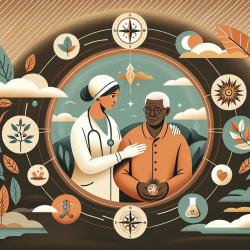Online therapy has revolutionized mental health care, providing accessible and flexible support to individuals worldwide. As practitioners in this evolving field, continuous improvement of skills and techniques is essential. One valuable resource for enhancing these skills is the research article titled Part I Dictionary, which offers critical insights into disaster medicine and humanitarian relief that can be applied to online therapy practices.
Understanding Key Concepts from the Research
The research article, Part I Dictionary, authored by S. William A. Gunn, delves into various terms and concepts related to disaster medicine and humanitarian relief. Although the primary focus is on disaster scenarios, several principles can be translated into the realm of online therapy. Here are a few key concepts and their relevance to online therapy:
- ABCDE: This mnemonic acronym stands for Airway, Breathing, Circulation, Disability, and Exposure. In disaster medicine, it represents a primary survey for managing multiple injuries. In online therapy, practitioners can adapt this systematic approach to assess clients' immediate mental health needs and prioritize interventions.
- Adaptive Capacity: Defined as the ability of living organisms to respond to changes and adjust to variations, this concept is crucial for therapists. Enhancing clients' adaptive capacity involves building resilience and coping strategies to handle life’s stressors effectively.
- Access to Health Care: The article emphasizes that access to health care is a human right. Online therapists must ensure that their services are accessible to all, including marginalized populations, by addressing barriers such as technological access and cultural competency.
- Burnout: Highlighted as a state of physical and psychological exhaustion, burnout is a significant risk for therapists. Practitioners should implement self-care strategies and seek supervision to maintain their well-being and provide effective care.
Implementing Research Outcomes in Online Therapy
To enhance your practice based on the insights from Part I Dictionary, consider the following steps:
- Conduct Regular Assessments: Use a systematic approach, similar to the ABCDE method, to regularly assess clients' mental health status and adjust treatment plans accordingly.
- Build Resilience: Incorporate techniques that strengthen clients' adaptive capacity, such as cognitive-behavioral strategies, mindfulness, and stress management exercises.
- Ensure Accessibility: Evaluate and address any barriers to accessing your services. This might involve offering sliding scale fees, ensuring your platform is user-friendly, and providing services in multiple languages.
- Prioritize Self-Care: Develop a self-care plan to prevent burnout. This could include regular supervision, peer support groups, and setting boundaries between work and personal life.
Encouraging Further Research
While the insights from Part I Dictionary are valuable, ongoing research and continuous learning are crucial in the field of online therapy. Practitioners are encouraged to stay updated with the latest studies, attend professional development workshops, and engage in peer discussions to refine their skills further.
For a deeper understanding of the concepts discussed, practitioners can refer to the original research paper: Part I Dictionary.










